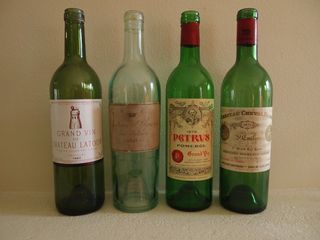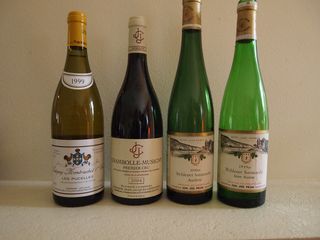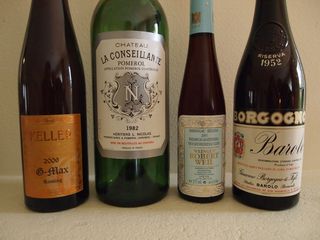Does the perfect wine exist? It is a question that seems to be vexing wine lovers all over the world. Many people take Robert Parker's judgement as a benchmark - if he awards a wine 100 points, it must be considered perfect. And by consequence, when they get to (finally) taste such a wine, they expect the Holy Spirit to descend on them. Very rarely however, epiphany will happen when you taste a wine. I have experienced it on a few occasions (see below), but 100 PP is certainly no guarantee. In fact, I have tasted 100 PP wines which I just did not like (Termanthia 2004 is a case in point - no wine in the world needs 200% new oak!). Wine will always be a matter of personal taste. So is there such a thing as a perfect wine?

I like to entertain my own concept of a perfect wine. To my mind, a wine is perfect when it is the best possible expression of a terroir in a given year. When the winegrower gets everything right in the vineyard and in the cellar, the wine that results is perfect because it is everything that it can be. In that sense perfection exists. All the rest to me is hocus-pocus. Let me try to explain.

First, I would like to refer to a Fine Wine Experience tasting of JJ Prüm Auslese wines which I attended in 2008. It featured wines from 2003 all the way back to 1949. Every single wine we tasted, spoke eloquently of the Wehlener Sonnenuhr vineyard from which they all hailed. But what most struck me, was that every wine was a perfect and distinguishable expression of the growing season that produced it. The 1971 was perhaps the greatest of them all (it was a perfect year in the Moselle), but it would be futile to claim that that wine was perfect and that e.g. the 1949, 1959, 1969, 1976 or 1983 (to young seeming still!) were not. In their individual ways they were all exactly what they could and should be.
Secondly, in 2009 I attended a tasting of Château Lafleur wines hosted by the owners Jacques and Sylvie Guinaudeau. Lafleur is one of the most revered wines in Pomerol, Bordeaux and indeed the world. The small vineyard is tended like a garden (Hugh Johnson Pocket Wine Book 2011, page 97). The 100 PP Lafleur 2000 (currently GBP 1,124 IB at Fine & Rare Wines - per bottle, that is) was a most impressive wine indeed and I was very grateful for the extra drop the thoughtful staff poured me.
More importantly however, Jacques Guinaudeau said that he preferred the (92 PP) 2001 to the 2000 - he believed it would be the greater wine in time and his opinion should count for something. It did to me - I went out to get 6 bottles of the 2001 for a fraction of the price of the 2000 and I am waiting patiently for time's verdict. He went on to explain that he couldn't understand how the critics "who came by twelve months after the harvest and were never seen again afterwards", could purport to know which wine would be the best 20 years after the vintage when they would reach their apogee. He was also very candid about his occasional errors - he explained that in 1998 he harvested his Cabernet Franc too early and that that had detracted from the quality of the wine. A great vigneron and a great man!
It is a lot to ask of a vigneron, to get everything right every time. There are so many decisions to take and questions to answer every year. They are also different from region to region and from wine to wine. Effeuillage, when and to what extent? Green harvest? When to harvest the grapes? The level of destemming? Cold maceration - how long? How much new wood? The toast of the wood? Bâtonnage - yes/no or how often? How long to leave the wine in wood? The composition of the final blend - which barrels to select? The list is endless. In great vintages it is relatively easy - there is great raw material to work with. In lesser years the great vigneron really comes into his own. In those years only a combination of experience, instinct, science and perfectionistic attention to detail will make the most of what is available.
So to me the concept of a perfect wine is really a celebration of the dedication of a great vigneron. In my recent experience, the Chambolle Musigny Premier Cru 2004 (a blend of two tiny parcels of Les Châtelots and Les Feusselottes) by Jean-Jacques Confuron is a case in point. It doesn't have the power or the structure of the 2002 and 2005 renditions which I also have in my cellar, but at six years of age it is already totally delicious; the silk and elegance of Chambolle personified and it avoids the herbaceousness that mars many 2004's in Burgundy. What's not to like? It is not necessarily as great as the 2002 or 2005 may potentially be in time, but today it is perfect in its own right.
In the same vein, Klaus-Peter Keller's Grosse Gewächse from 2006 are perfect expressions of their terroirs in this very difficult vintage in Rheinhessen. They may not have the almost Burgundian richness and immediate appeal of his 2004's or 2005's, but they are the product of totally perfectionistic vineyard management and they have a great future ahead of them in their more understated, relatively slender way.
Greatness and perfection are not the same thing and they should not be mistaken. The search for a great wine, "a wine of spellbinding resonance and beauty, leaving the drinker with a sense of wonder" (as Andrew Jefford has so very aptly put it) is very much worthwhile and rewarding. I devote a large part of my life to it. Searching for THE perfect wine is futile. Beauty will always be in the eye of the beholder.

So do truly great wines (100 PP or not) always provide you with that sense of epiphany? No, not necessarily. That emotion is even more personal. I have had my share of truly great 1982 clarets for instance (Gruaud-Larose, Cheval Blanc, Léoville-las-Cases, Mouton-Rothschild, Pichon-Lalande, Latour) and I have thoroughly admired them, but they didn't alter my state of consciousness (although the latter two came close - fond memories!). Not even the glorious Yquem 1921 did. But Pétrus 1971, Leflaive Puligny Pucelles 2000, Borgogno Barolo Riserva 1961, Noval 1931, Weil's Kiedricher Gräfenberg TBA "316 Oechsle" 2003, Blandy Bual 1933 and Barbeito Terrantez 1795 did send me into orbit. Don't ask me why, I don't know - they just "pushed that button". It is ever so personal and I will keep on searching!
Xavier Auerbach












